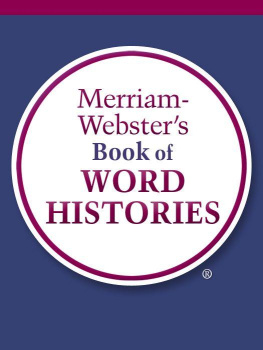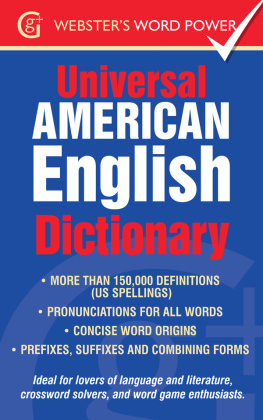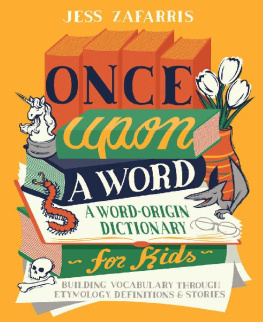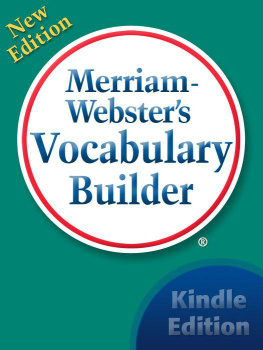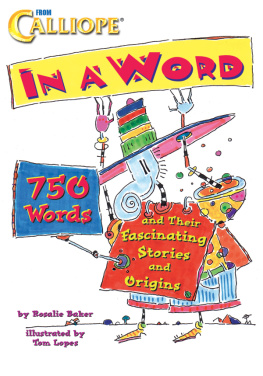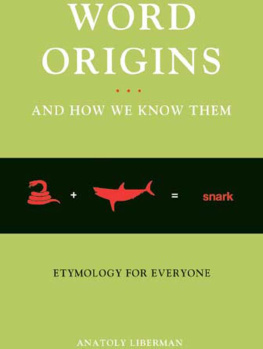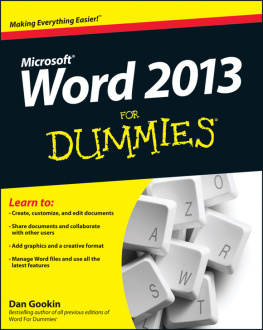Justice David B. (Editor) - Merriam-Websters Book of Word Histories
Here you can read online Justice David B. (Editor) - Merriam-Websters Book of Word Histories full text of the book (entire story) in english for free. Download pdf and epub, get meaning, cover and reviews about this ebook. genre: Science. Description of the work, (preface) as well as reviews are available. Best literature library LitArk.com created for fans of good reading and offers a wide selection of genres:
Romance novel
Science fiction
Adventure
Detective
Science
History
Home and family
Prose
Art
Politics
Computer
Non-fiction
Religion
Business
Children
Humor
Choose a favorite category and find really read worthwhile books. Enjoy immersion in the world of imagination, feel the emotions of the characters or learn something new for yourself, make an fascinating discovery.
- Book:Merriam-Websters Book of Word Histories
- Author:
- Genre:
- Rating:5 / 5
- Favourites:Add to favourites
- Your mark:
Merriam-Websters Book of Word Histories: summary, description and annotation
We offer to read an annotation, description, summary or preface (depends on what the author of the book "Merriam-Websters Book of Word Histories" wrote himself). If you haven't found the necessary information about the book — write in the comments, we will try to find it.
It is nonetheless true that many of our words have interesting histories, and scholarly learning is not required to appreciate them. Once a readers interest has been piqued by the realization that behind one English word lies a myth of the ancient Greeks, while another word can be traced to a twentieth-century American comic strip, it is perfectly easy to become addicted to the fascinating study of etymology, at least in an amateur way.One of the aims of Merriam-Websters Book of Word Histories is to foster the readers interest in that study in the hope that it will deepen into fascination. Although the articles in this book have been arranged alphabetically for ease of reference, they invite browsers to move about in the book as a cross-reference or a whim takes them. Many thousands of English words have histories of more than routine interest, but only a small sampling could find space here. Still, the more than six hundred articles which form the heart of the book, many of them devoted to several etymologically or semantically related words, offer material to catch the fancy of all readers, whatever their interests. In part because throughout its history English has been highly receptive to outside influences on its wordstock, prolific in creating new words from its own familiar elements, and given to the development of new meanings over the course of time, these articles are extremely diverse. In them will be encountered several of the people, famous or obscure in their own right, whose names have become generic words. One can learn of processes of language, like folk etymology, that transform existing words into new ones and can catch glimpses of the social, cultural, and religious history, not of the English-speaking nations alone, but also of the peoples from whom we have borrowed new words. But an inventory of all the contents of these articles would soon grow tiresome. Readers are invited to discover for themselves the variety this book contains.At the same time that Merriam-Websters Book of Word Histories attempts to satisfy the readers curiosity about the stories associated with many English words, it also aims to domesticate that often formidable beast, the dictionary etymology. Thus, nearly every entry, whether it includes an article or merely refers to an article elsewhere in the book, is accompanied by an etymology presented in the style ofWebsters Third New International Dictionary, though with cross-references (which are likely to be more frustrating than revealing outside of the dictionary) omitted. The table of abbreviations used in these etymologies will give readers much assistance with the compressed presentation of information in an etymology, and the pronunciation symbols used in several articles are explained in a separate section. Finally, an interesting and helpful introduction follows this preface and discusses briefly such matters as the history of English and its relation to its language family, the sources of English loanwords, and the development of new meanings in the language itself. Its closing paragraphs are devoted to a clarification of some points about the etymologies given in this book so that the reader may know just what they sayand do not say. Everyone who reads this book will find that a careful perusal of the introduction repays the time and attention devoted to it by enhancing appreciation and understanding of both the articles and the etymologies.
Justice David B. (Editor): author's other books
Who wrote Merriam-Websters Book of Word Histories? Find out the surname, the name of the author of the book and a list of all author's works by series.

